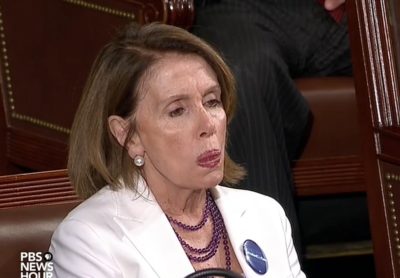A recent Congressional Research Service profile of the 115th Congress highlights the rising age of lawmakers, an issue that continues to plague Democrats with calls for fresh blood in leadership.
 The average age of members in the 115th Congress is 57.8 years for representatives and 61.8 years for senators – “among the highest of any Congress in recent U.S. history,” according to the report.
The average age of members in the 115th Congress is 57.8 years for representatives and 61.8 years for senators – “among the highest of any Congress in recent U.S. history,” according to the report.
Other analysis reveals it’s a much bigger issue for Democrats – the self-described party for the young – than it is for Republicans.
Quorum points out the average age of House party leadership is 72 for Democrats and 48 for Republicans. The average age of chairmen and ranking members: 68 for Democrats and 59 for Republicans.
It’s also obvious to anyone who watches politics, with Democrats’ most visible and vocal elderly advocates.
Maxine Waters – with her relentless calls to “impeach 45!” – would be 80 by the beginning of the 116th Congress, while House Minority Leader Nancy Pelosi is only a year behind. Both women are more than twice the median age of constituents in their districts, according U.S. Census data compiled by Census Reporter.
The Democrats’ second in command in the House, Whip Steny Hoyer, is 78 years old. Number three, Assistant Democratic Leader James Clyburn, is 78.
It’s the same situation with Democrat California Sen. Dianne Feinstein, who is currently 84 years old.
Other Democrats taking credit for engaging the youth vote or capitalizing on popular cultural movements are also well over the hill.
Former Vice President Joe Biden, the creepy uncle supporter of the #metoo movement, was born in 1942, during World War II.
Bernie Sanders, who pandered to college liberals with his socialist policies during the 2016 election, is a year older than Biden.
If the current Democratic leadership — in the House, the Senate and the Democratic National Committee (DNC) — can’t figure out how to motivate voters and raise the money to win the November 6 midterm elections, they all should quit. https://t.co/vx6tl0cSVY
— Juan Williams (@TheJuanWilliams) May 2, 2018
It’s a situation that’s forcing a lot of Democratic candidates, especially those in districts Trump won in 2016, to distance themselves from their party’s ringleaders.
“I think we need a whole new generation of people in D.C.,” 34-year-old Dan McCready, a Democrat running in Charlotte, North Carolina’s rural suburbs, told The Washington Post. “That’s part of why I’m running; we need some new blood.”
It’s a strategy that’s already proven to work. Pennsylvania’s Connor Lamb eked out special election victory after he promised not to vote for Pelosi for House leadership if Democrats take control of the lower chamber.
“My opponent wants you to believe that the biggest issue in this campaign is Nancy Pelosi. It’s all a big lie,” the 33-year-old said in a television ad. “I’ve already said it on the front page of the newspaper that I don’t support Nancy Pelosi.”
Now, it’s becoming a trend.
“If I’m elected to Congress I will not vote for Nancy Pelosi for leader of the Democrats,” Dan Kohl, Democrat challenging incumbent Republican Glenn Grothman for Wisconsin’s 6th congressional district, told WITI this week. “When I get to Washington, I’ll see what my choices are, but I do think we need change coming on the Democratic side.”
Leave a Comment
COMMENTS POLICY: We have no tolerance for messages of violence, racism, vulgarity, obscenity or other such discourteous behavior. Thank you for contributing to a respectful and useful online dialogue.